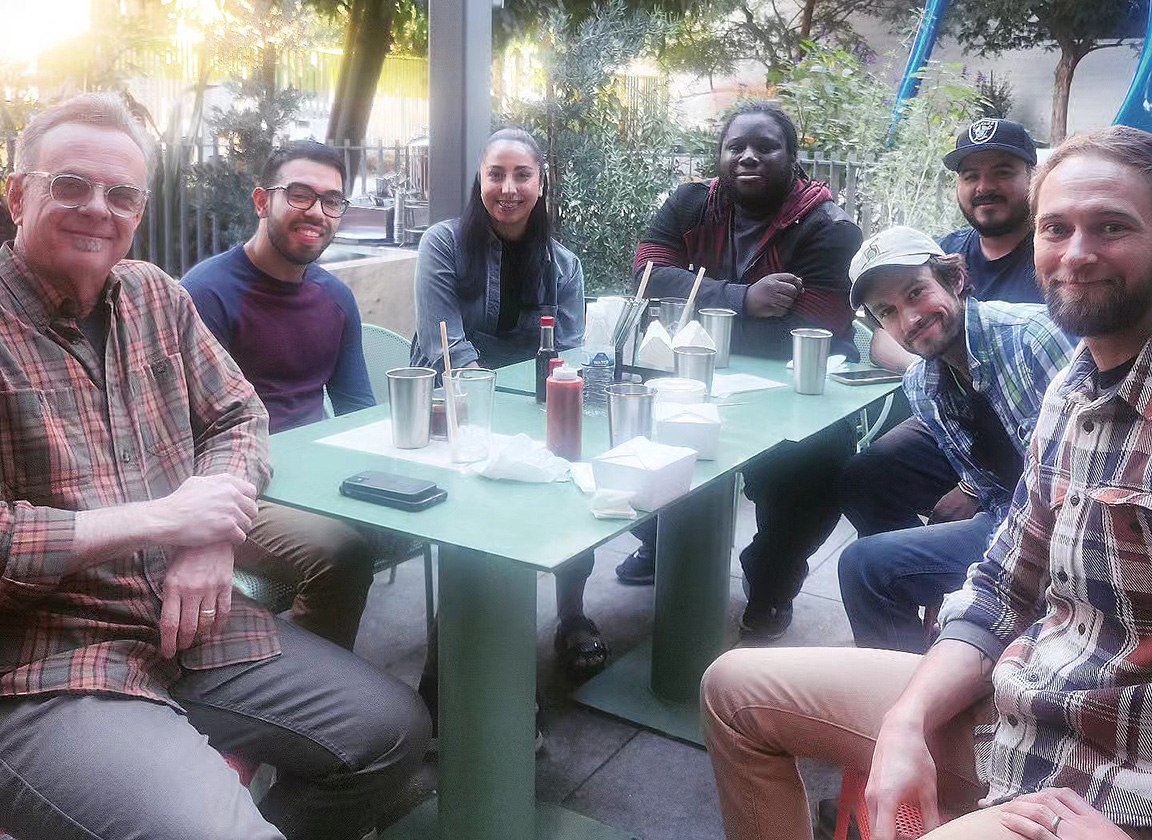
Tim Alderson, left, retiring founding director of Seeds of Hope, and new director Steve Trapasso, leaning in at right, gather with staff and volunteers. Photos: Seeds of Hope
[The Episcopal News] Steve Trapasso had just finished a food giveaway and cooking demonstration, turning fresh vegetables into nutritious cauliflower soup for residents of West Hollywood apartments, and was headed back to the Seeds of Hope storage hub.
“Every Tuesday we have three distributions in West Hollywood, and at nine different sites throughout the month” as part of their contract with the city and with the West Hollywood Community Housing Corporation, a senior living agency, said Trapasso, who in January succeeded Tim Alderson as executive director of Seeds of Hope, the diocesan food justice ministry.
“We give away about 20 pounds of produce to each person each time they come to a distribution.”
Since Seeds of Hope began in 2013, the ministry has grown to provide over 8 million servings, or 1.6 million pounds of fresh fruits and vegetables annually to more than 180,000 households at 64 sites in collaboration with 25 partner organizations.
“This is all accomplished by a staff of four,” and a full-time student intern, said Alderson, who created the ministry at the request of then-Bishop J. Jon Bruno, and who retired in December 2023. “Seeds of Hope relies heavily on volunteers, who can sign up for opportunities at seedsofhopela.org/volunteer.” The agency raises its funding through grants from a number of sources.
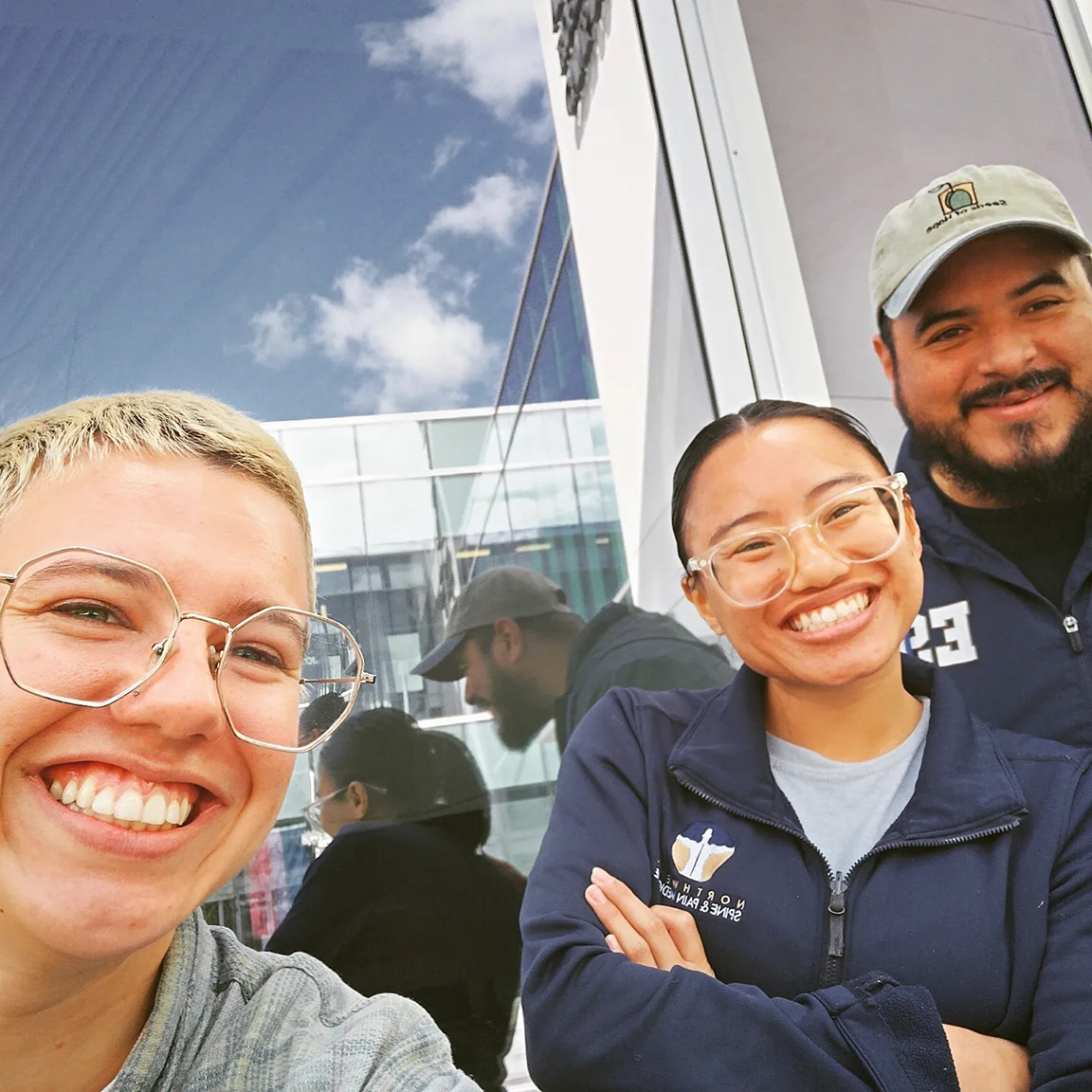
Seeds of Hope staffers Danae, Lacy and Andrew carry on ministry’s service to the community.
Seeds of Hope began as a Hands in Healing initiative, conceived while Bruno battled leukemia at City of Hope Medical Center in Duarte. He reached out to his friend Alderson, a fifth-generation California farmer and the founding chairman of the California School Garden Network.
Bruno “was inspired by what we had done statewide with school gardens, and it was like, ‘what if we did that with all the churches in the diocese?’” Alderson recalled. A “farm the diocese” effort quickly took shape, and clergy, congregations and even their neighbors got on board, he said.
Diocesan leaders laud the agency’s work as it has developed and grown over the years. “Tim Alderson had a vision and the experience to bring Seeds of Hope into being, with God’s help and the support of our diocese,” said the Rev. Canon Melissa McCarthy, canon to the ordinary. “His work has been transformational and healing for so many people across the southland. Tim and his team have been the face of Christ for so many people and have put the Diocese of Los Angeles on the map in profound ways.”
Garden revitalizes Monrovia congregation
The Rev. Neil Tadken had just begun serving as rector of St. Luke’s Church in Monrovia, which was “small, struggling and locked up tighter than a drum and seemingly irrelevant in the community other than for the people who were there, which was just a handful at that point,” when he learned of the Seeds of Hope initiative, he told The Episcopal News in a recent telephone interview.
“I thought, let’s start putting this property to work,” Tadken said. After removing dense weeds and dead oleanders, parishioners planted a fruit orchard—citrus, stone fruit, apple, pear, plum and peach trees—and installed an irrigation system.
“Within 2 years we started harvesting and I was amazed. Now, we’ve got a great team of people who have come to look for harvesting on a regular basis. It looks beautiful now. The neighborhood notices and is impressed.” One local Nazarene church, Mountainside Communion, “grows seedlings here and has distributed over a thousand plants to various schools over the past few years.” The produce and partnerships that ensued prompted Tadken’s church to change its name to St. Luke the Physician, he said.
“Our main call is to heal the world in body, mind, and spirit. By providing fresh produce to the local food pantry … (we are) healing the world one welcome at a time. People are very inspired and comforted coming to realize that we’re not just a church. It helps them grasp what’s important in this community in a visceral way.”
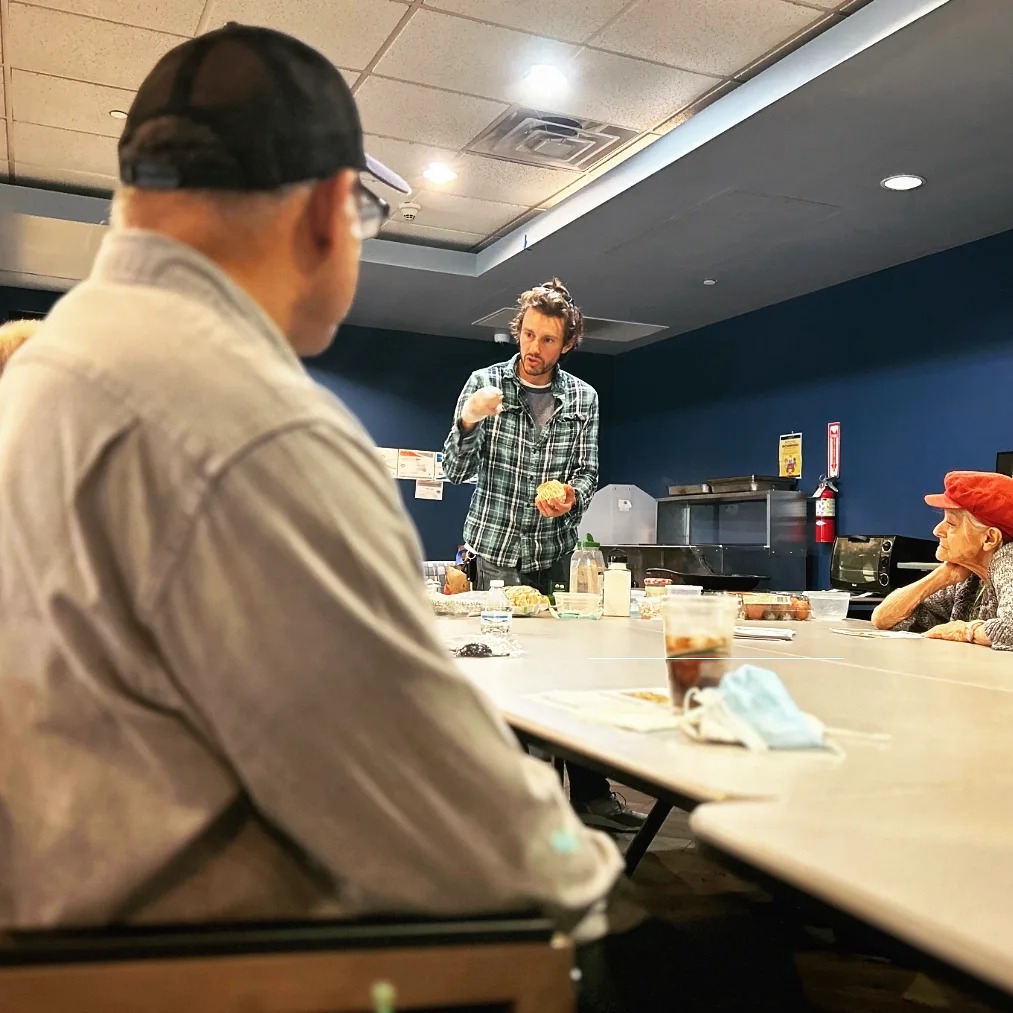
Steve Trapasso, a Seeds of Hope employee since 2014, teaches a class on healthy cooking. Trapasso recently succeeded Tim Alderson as executive director of the agency.
A growing, developing ministry
Seeds of Hope’s identity has also shifted to include nutrition education, food recovery and distribution, and, eventually, increased healthcare partnerships, Trapasso hopes.
“For the future, I’m gearing Seeds of Hope up to start taking Medicare and Medicaid and work more with healthcare partners,” he told The News recently. “Right now, we have a contract with seven different hospitals in the San Gabriel Valley to do nutrition referral services.
“So a hospital will get someone who comes to the emergency room, and they’ll have an underlying health condition, but the main reason they’re there is they are food insecure or housing insecure or don’t have proper transportation. If they are food insecure, the hospital connects them to us and we connect to food resources, whether Cal Fresh or Project Angel Food or our food giveaway at City of Hope.”
Trapasso joined Seeds of Hope in January 2014 after earning a master’s degree in public health from Tulane University in New Orleans.
He remembers the early days “when literally, we started with Bishop Diane Jardine Bruce’s old Toyota Camry and would go to site after site, load it with food, bring it to a class, distribute the produce, do a cooking class, and teach people how to grow the food. From that model came what we are today.
“That model inspired the county to change their whole contract system,” he added.
“Seeds of Hope was by far our strongest partner,” agreed Dipa Shah Patel, director of the L.A. County Department of Public Health Nutrition and Physical Activity Program, a program to reach residents “where they live, learn, work, play and pray.”
Alderson’s visionary leadership and innovation “informed our entire program for our current funding cycle,” she said. “It influences $7 million going out from the county Department of Public Health and impacts 18 funded partners. We have created a whole network of food redistribution and distributed over 3 million pounds of food with over 50 unique varieties of fruits and vegetables, and that is absolutely from the leadership of Tim and his team.”
In L.A. County, about 500,000 low-income households experience food insecurity, she said. About 70% of people eligible for the federally funded Supplemental Nutrition Assistance Program known as SNAP are overweight or obese and almost 37% or 185,000 of food insecure households experience obesity.
“They’ve led the way in implementing innovative programs to reach the most vulnerable in our county and we look forward to continuing to partner with them in the years to come.”
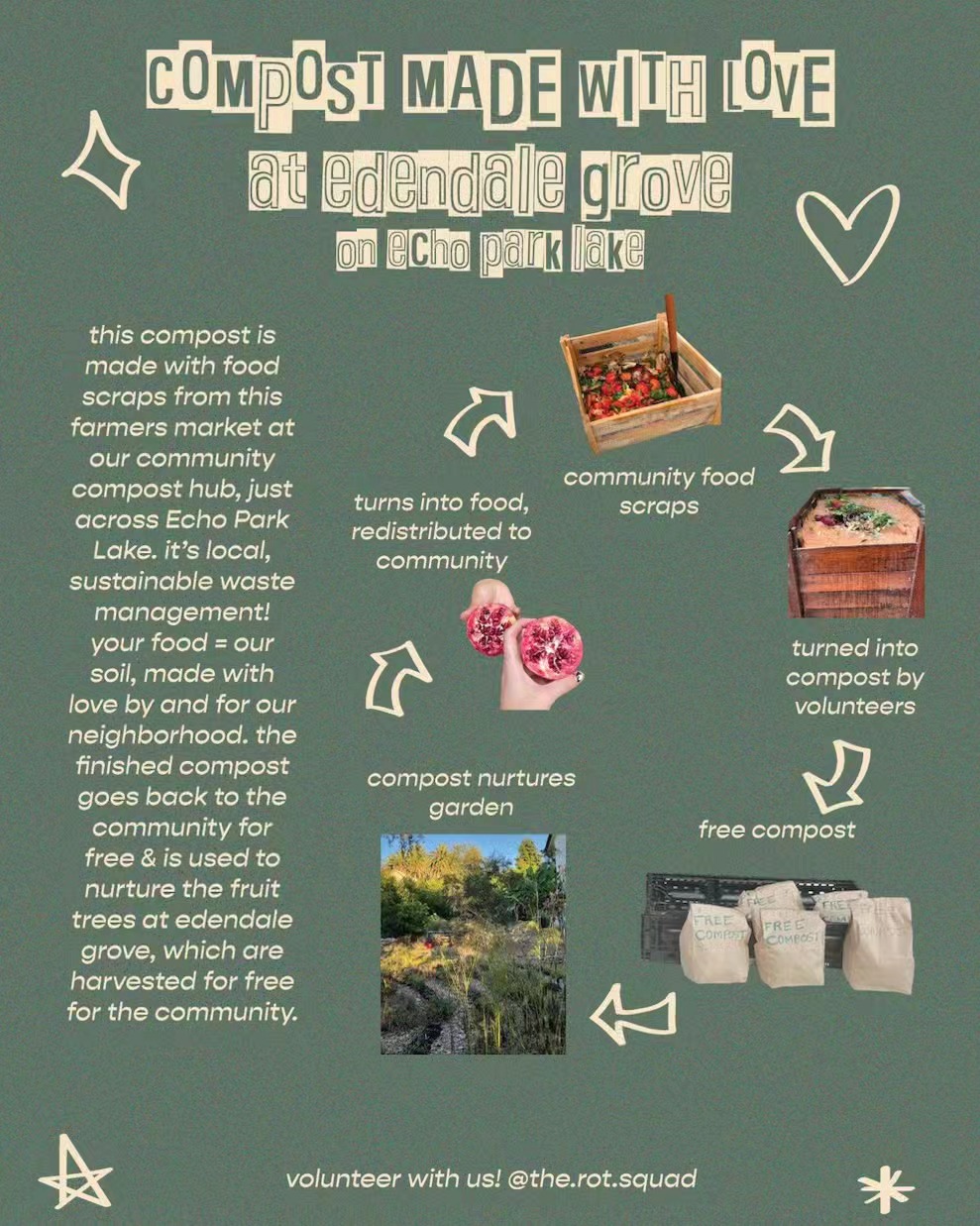
Poster encourages neighbors to take part in a composting project at Edendale Garden in Echo Park.
Partnerships feed the hungry, help save the planet
Alderson partnered with Food Forward, Inc., a nonprofit organization that recovers surplus fruits and vegetables and brings them to the food insecure to prevent waste and help the planet, he said.
“Everybody has fruit trees in Southern California, and most of that fruit goes to the dump,” Alderson recalled. “We are taking food and giving it to people rather than dumping it in a hole in the ground and letting the methane gas ruin our climate.”
Addressing food insecurity inevitably leads to issues of economic justice, and preserving dignity, he said. At a traditional food pantry, “you stand in line and somebody says, ‘here’s your bag of stuff.’ And then you open your bag, and it may or may not be stuff you recognize. It may be stuff you recognize that you hate. We distribute food in a free farmer’s market style so it’s literally like a farmer’s market, only you don’t pay for it.
“We also learned that some people come with bags, not only for themselves, but they’re getting food for everybody in their apartment building.
“The other thing we found was giving people the opportunity to volunteer. It changes the dynamic and it takes away some of the feeling of helplessness. Now they can help their community too.”
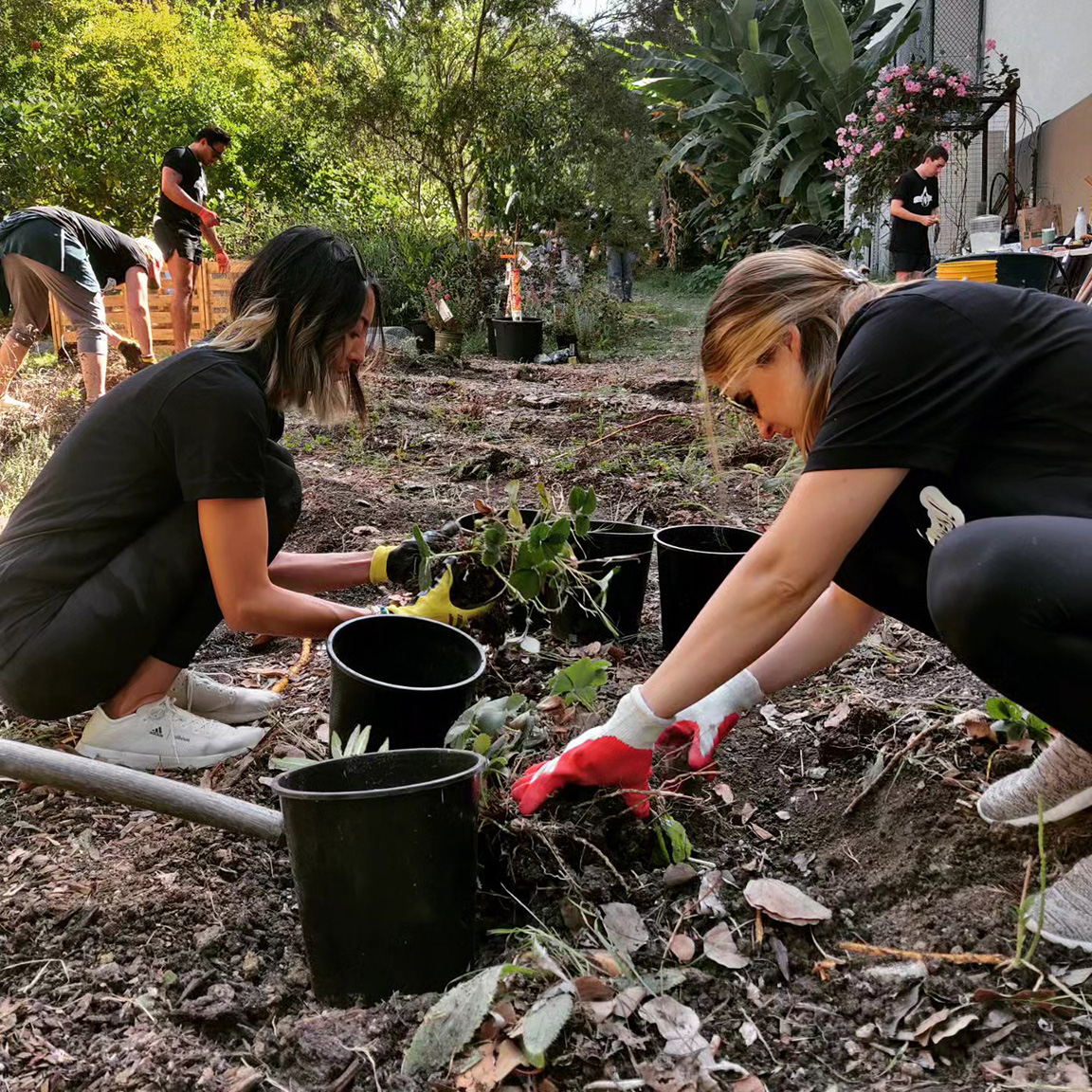
Volunteers work at Edendale Grove, the Seeds of Hope garden next to St. Paul’s Commons in Echo Park, Los Angeles.
Seeds of Hope and St. Stephen’s, Hollywood: a great match
Seeds of Hope’s operations are based at St. Stephen’s Church in Hollywood, where two refrigerated shipping containers, refrigerated trucks and forklifts, a mobile office, and vans are stored, said the Rev. Canon Jaime Edwards-Acton, rector.
For Edwards-Acton, executive director of the Jubilee Consortium, which since 2006 has offered health and nutrition education and other classes to underserved communities, partnering with Seeds of Hope has been a great match.
“Tim is connected and a big, bold thinker,” Edwards-Acton said. “He still serves as board chair for the Jubilee Consortium. He can see the big-picture possibilities and potential positive outcomes, whether starting new programs or building partnerships or reimagining spaces or communities.”
St. Stephen’s volunteers distribute up to 700 boxes of fresh fruits and vegetables weekly, he said. “I would love it if both Seeds of Hope and Jubilee become part of recapturing some of the initial vision that Bishop Jon Bruno talked about,” he told The News.
Bruno’s vision was “to see the churches in the diocese become centers, both in sense of space and community, where there is talk about food justice, climate justice, nutrition and it becomes part of the ethos, the buzz of the church. Where, in that context, there is leadership development happening both at the lay and ordained level and from folks outside the church that see the church as a trusted institution where they can participate in these conversations around leadership, food justice, climate justice.”
It’s already happening in Echo Park at the Edendale Grove, Trapasso said.
“Tim’s fingerprints are on every tree on that plot of land. We have a community compost hub and we get 25 volunteers every week, cleaning things up, composting, fertilizing, pruning trees. They think The Episcopal Church is so cool because they allow us to grow food and to have this community space on church property. The church benefits from just the good will that comes from that.”
Trapasso wants the diocesan community to recognize Seeds of Hope as a resource. “If there’s anyone in their lives who needs help, they can call us. We have a ton of partners, who can get people signed up for Medical, for Medicaid, for Medicare, Cal-Fresh, WIC, any kind of resource that people need help with.
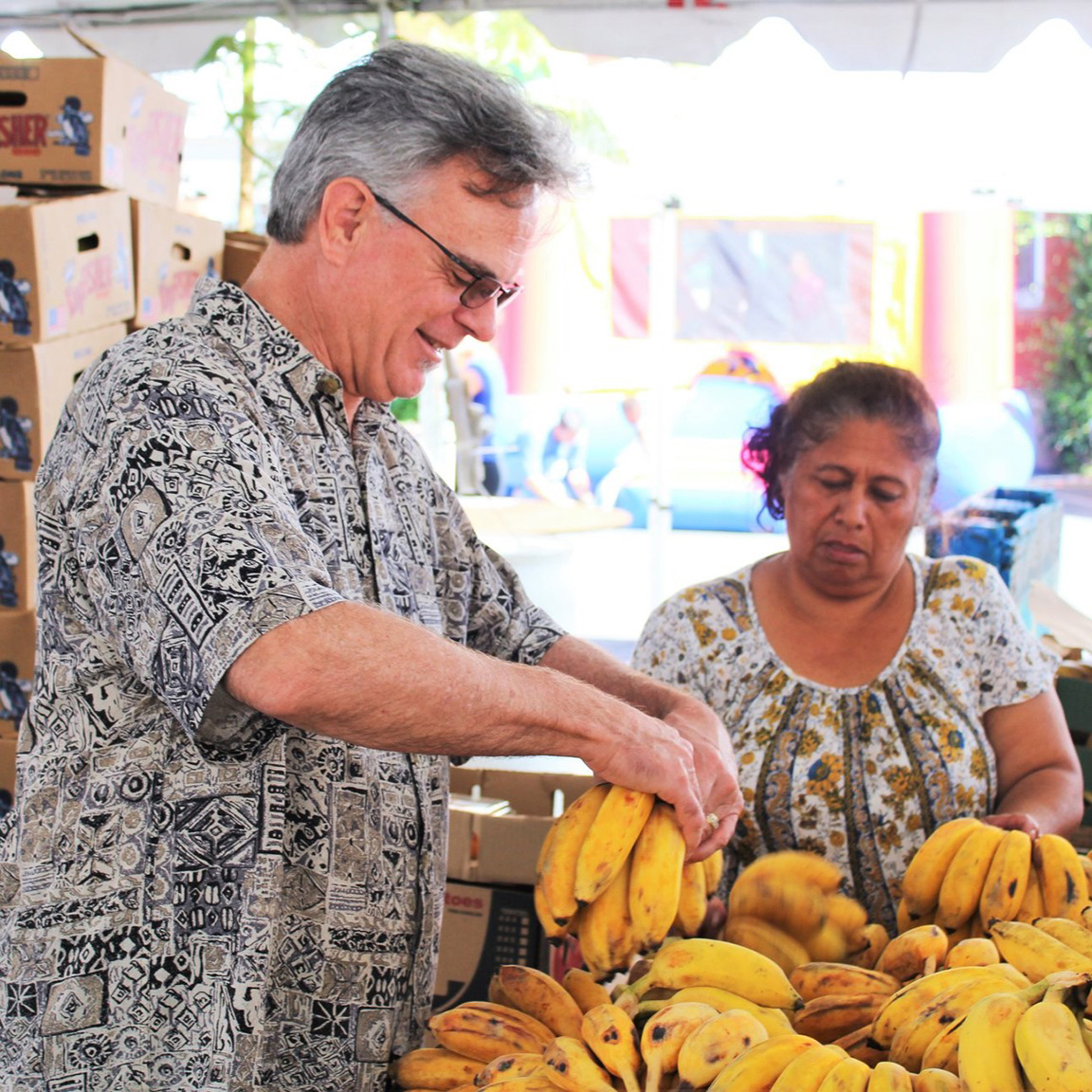
Retiring Seeds of Hope director Tim Alderson assists a food distribution center client.
“Tim’s all about giving people the resources they need and whatever they need with dignity.”
Erica Nieves, who joined Seeds of Hope right out of college in 2014 and now coordinates the Pasadena Department of Public Health’s Promotores training program, agreed.
“It was all about education, food access, and policy. We built gardens and maintained gardens and did nutrition education and workshops,” she said during a recent telephone interview.
While serving at Seeds of Hope, she earned a master’s degree in nutrition education and credits Alderson for her passion for community outreach. “From the beginning Tim … created a culture where we all loved what we were doing. We all knew what the overall goal was. We were invested.”
Alderson also “found a way to include our dreams and aspirations” in the organizational vision, she added. “Seeds of Hope is so important when we think of the social determinants of health. It really focuses on all the factors that affect a person when it comes to their health. It creates partnerships, finds funding, provides access or resources to people so that they can be healthy in whatever capacity in their own way.”
Trapasso is the “perfect person” to take up the mantle, she added. “Firsthand, I witnessed how he cultivated relationships with other partners and participants, and I strive to follow that in everything I do in the work moving forward. I’m so excited for him and his vision with Seeds of Hope. I know that it’s going to flourish.”
Becoming a health care hub
Seeds of Hope partners with city, county, and community organizations, offering food and nutrition education at hospitals, an LGBTQ center, churches, schools, and other religious-based institutions.
There are also partnerships with UCLA and Cal State Los Angeles, USC and the USC Medical School, he said. “We get about ten UCLA interns a year; eight USC medical students, and about a dozen nutrition students from Cal State L.A., who help us out in the field.”
Seeds of Hope also partners with a doctor at UCLA Health, Trapasso said, and nurses at Queens Care. He envisions becoming a holistic health care hub. Food giveaways don’t “solve the root cause of the problems,” he said. “So, if we talk to people about nutrition and healing and if we can change policy, then we can have an impact, where a range of needs might be met.
“I want Seeds of Hope to be a one-stop shop.”
